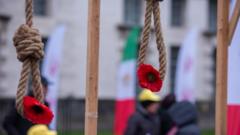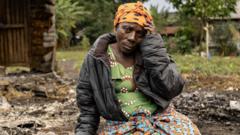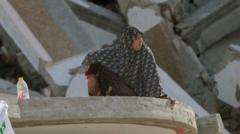Human rights concerns escalate as Iran witnesses a notable rise in executions, including increased cases among women and ethnic minorities, according to the UN.
Surge in Executions in Iran Continues Amid Global Outcry

Surge in Executions in Iran Continues Amid Global Outcry
UN reports show a staggering 901 executions in Iran during 2024, marking a disturbing trend in capital punishment.
Article Text:
Iran has reportedly executed at least 901 individuals in 2024, as highlighted by the United Nations human rights chief. This alarming figure marks the highest toll in nearly a decade and reflects a 6% increase from the previous year's reported 853 executions.
Volker Türk, the UN human rights chief, expressed grave concern over the rising trend, stating, "It is deeply disturbing that yet again we see an increase in the number of people subjected to the death penalty in Iran year-on-year." He emphasized the urgent need for Iranian authorities to address the escalating issue of capital punishment.
The majority of the executions were associated with drug-related offenses; however, individuals connected to anti-government protests in 2022 also faced execution. Moreover, the year witnessed a rise in executions of women, raising further alarm among human rights advocates.
Türk strongly urged the Iranian government to implement an immediate moratorium on the death penalty, advocating for an eventual total abolition. He asserted, "The death penalty is incompatible with the fundamental right to life and raises the unacceptable risk of executing innocent people."
Reliable data for these figures has been sourced from multiple organizations, including Iran's Human Rights Activists News Agency (HRANA) and Iran Human Rights (IHR). IHR's recent report indicated that at least 31 women were executed in 2024, the highest number since monitoring began 17 years ago. Notably, this included cases where women were tried for severe crimes, including murder, and drug-related offenses.
Furthermore, a report by the Kurdish human rights group Hengaw disclosed that more than half of those executed belonged to ethnic minorities, including 183 Kurds. Since the nationwide "Woman, Life, Freedom" protests were triggered by the death of a young Kurdish woman in police custody, ethnic and religious minorities have faced oppressive crackdowns by the Iranian government.
Amid these grim statistics, HRANA reported the execution of five juvenile offenders, which contravenes international law prohibiting capital punishment for individuals under 18 at the time of their alleged crimes.
According to Amnesty International, Iran accounted for an overwhelming 74% of all recorded executions globally in 2023, not including China, where data on executions is kept classified despite estimates suggesting thousands occur annually. Human rights advocates continue to decry the worsening situation in Iran, calling for a reevaluation of the legal system and an end to capital punishment practices.
Iran has reportedly executed at least 901 individuals in 2024, as highlighted by the United Nations human rights chief. This alarming figure marks the highest toll in nearly a decade and reflects a 6% increase from the previous year's reported 853 executions.
Volker Türk, the UN human rights chief, expressed grave concern over the rising trend, stating, "It is deeply disturbing that yet again we see an increase in the number of people subjected to the death penalty in Iran year-on-year." He emphasized the urgent need for Iranian authorities to address the escalating issue of capital punishment.
The majority of the executions were associated with drug-related offenses; however, individuals connected to anti-government protests in 2022 also faced execution. Moreover, the year witnessed a rise in executions of women, raising further alarm among human rights advocates.
Türk strongly urged the Iranian government to implement an immediate moratorium on the death penalty, advocating for an eventual total abolition. He asserted, "The death penalty is incompatible with the fundamental right to life and raises the unacceptable risk of executing innocent people."
Reliable data for these figures has been sourced from multiple organizations, including Iran's Human Rights Activists News Agency (HRANA) and Iran Human Rights (IHR). IHR's recent report indicated that at least 31 women were executed in 2024, the highest number since monitoring began 17 years ago. Notably, this included cases where women were tried for severe crimes, including murder, and drug-related offenses.
Furthermore, a report by the Kurdish human rights group Hengaw disclosed that more than half of those executed belonged to ethnic minorities, including 183 Kurds. Since the nationwide "Woman, Life, Freedom" protests were triggered by the death of a young Kurdish woman in police custody, ethnic and religious minorities have faced oppressive crackdowns by the Iranian government.
Amid these grim statistics, HRANA reported the execution of five juvenile offenders, which contravenes international law prohibiting capital punishment for individuals under 18 at the time of their alleged crimes.
According to Amnesty International, Iran accounted for an overwhelming 74% of all recorded executions globally in 2023, not including China, where data on executions is kept classified despite estimates suggesting thousands occur annually. Human rights advocates continue to decry the worsening situation in Iran, calling for a reevaluation of the legal system and an end to capital punishment practices.



















